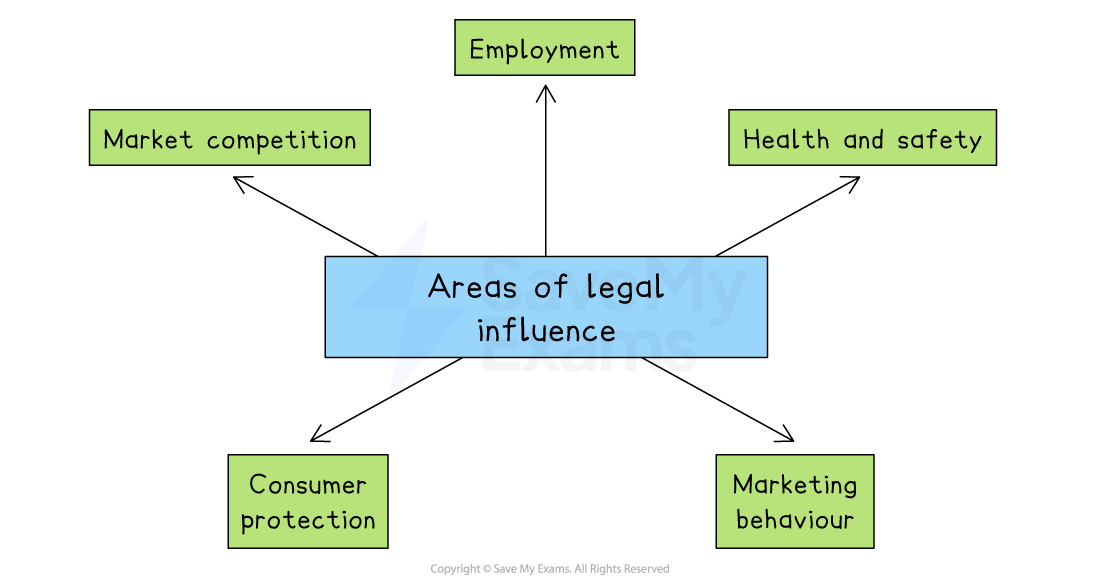Legal Influences (Cambridge (CIE) A Level Business): Revision Note
Exam code: 9609
An introduction to legal influences
Legal factors are laws and regulations that businesses must follow for a range of reasons, including:
To protect consumers from harmful substances
To protect consumers from misinformation
To ensure that businesses operate ethically
To ensure that business competition is healthy for society and does not become harmful or destructive
Governments use laws to guide how businesses behave
This helps protect workers, consumers, and the wider economy
The main areas of legal influence are shown on the diagram below

Employment law
Employee protection legislation prevents exploitation of workers
It covers areas including
Pay and working conditions
Equality of employment rights for marginalised groups (e.g. those with disabilities) to avoid discrimination
The right to belong to a trade union and take industrial action
Contracts and termination of employment
Health and safety of employees and contractors
Area of law | Typical coverage | Impact on business |
|---|---|---|
Pay and working conditions |
|
|
Equality of employment rights |
|
|
Right to belong to a trade union and take industrial action |
|
|
Contracts and termination of employment |
|
|
Health and safety law
Health and safety law is intended to protect the physical and mental wellbeing of employees and contractors
Laws in different countries typically cover
Provision of adequate rest periods
Acceptable workplace temperature and noise levels
Provision of safety equipment
Hygienic, safe and sanitary conditions
Manageable workloads
Safety procedures and equipment, e.g., fire exits and first aid kits
To comply with health and safety laws, businesses need to
Train and supervise staff properly on how to work safely
Adjust working hours and ensure proper rest is taken
Arrange manuals, signage, and legally required safety documentation
Purchase and maintain personal protective equipment and safety tools
Create and follow a health and safety policy or code of practice
Serious breaches of health and safety laws can lead to investigations, fines or prosecution.
Poor health and safety practices can also cause accidents, reduce staff morale and damage a business’s reputation
Case Study
IronForge Engineering Ltd
IronForge operates a busy metal fabrication plant. Workers often complain about
High indoor temperatures
Loud machinery with no hearing protection
Lack of proper safety gear when cutting and welding
Long shifts without proper breaks

Scenario
After a serious accident where a worker was injured by a falling object, the business was reported to the local health and safety authority
The company was ordered to
Install proper ventilation and provide ear protection
Reduce shift lengths and allow more frequent rest breaks
Provide hard hats, gloves, and protective clothing
Develop a written health and safety policy
Train all workers in equipment safety and emergency procedures
Impact
While the improvements increased costs at first, the business
Avoided prosecution
Saw fewer accidents and reduced staff turnover
Gained a better reputation with clients and employees
Marketing behaviour
Laws regulate marketing behaviour and protect consumers from unfair, misleading or harmful practices
They ensure that businesses advertise products truthfully, responsibly and ethically
Marketing strategies must comply with legal standards in areas such as
Advertising content
Data protection
Pricing and promotions
Comparisons with competitors
Failure to follow these laws can lead to fines, legal action or reputational damage
Areas of marketing law
Type of law | Explanation |
|---|---|
False or misleading advertising |
|
Use of personal data in marketing |
|
Advertising to children |
|
Unfair pricing |
|
Comparative and competitive advertising |
|
Consumer law
Consumer protection laws defend the rights of buyers and ensure that businesses act fairly, safely, and honestly
These laws create trust in the market by making sure that products sold meet certain standards and that consumers are not misled
Laws often cover
Product safety
Accuracy of information
Unfair contracts
Refunds or returns
Online and distance purchases
If businesses fail to follow these laws, they can face legal action, financial penalties or reputational damage
Areas of consumer law
Type of law | Explanation |
|---|---|
Product safety |
|
Right to information |
|
Right to refunds, repairs or replacements |
|
Protection against unfair contract terms |
|
Online and distance selling |
|
Competition law
Competition law helps ensure markets are open, fair and competitive
Powerful companies are prevented from using their position to dominate the market
Competition law can
Prevent price fixing and unfair collusion
Stop mergers or takeovers that reduce market competition
Ban abuse of monopoly power
If a company breaks competition law, it may face heavy fines, restrictions or forced break-up of business operations
Laws affecting market competition
Type of law | Explanation |
|---|---|
Ban on price fixing and cartels |
|
Control of mergers and takeovers |
|
Abuse of market power |
|
Access to markets for new entrants |
|

Unlock more, it's free!
Was this revision note helpful?
